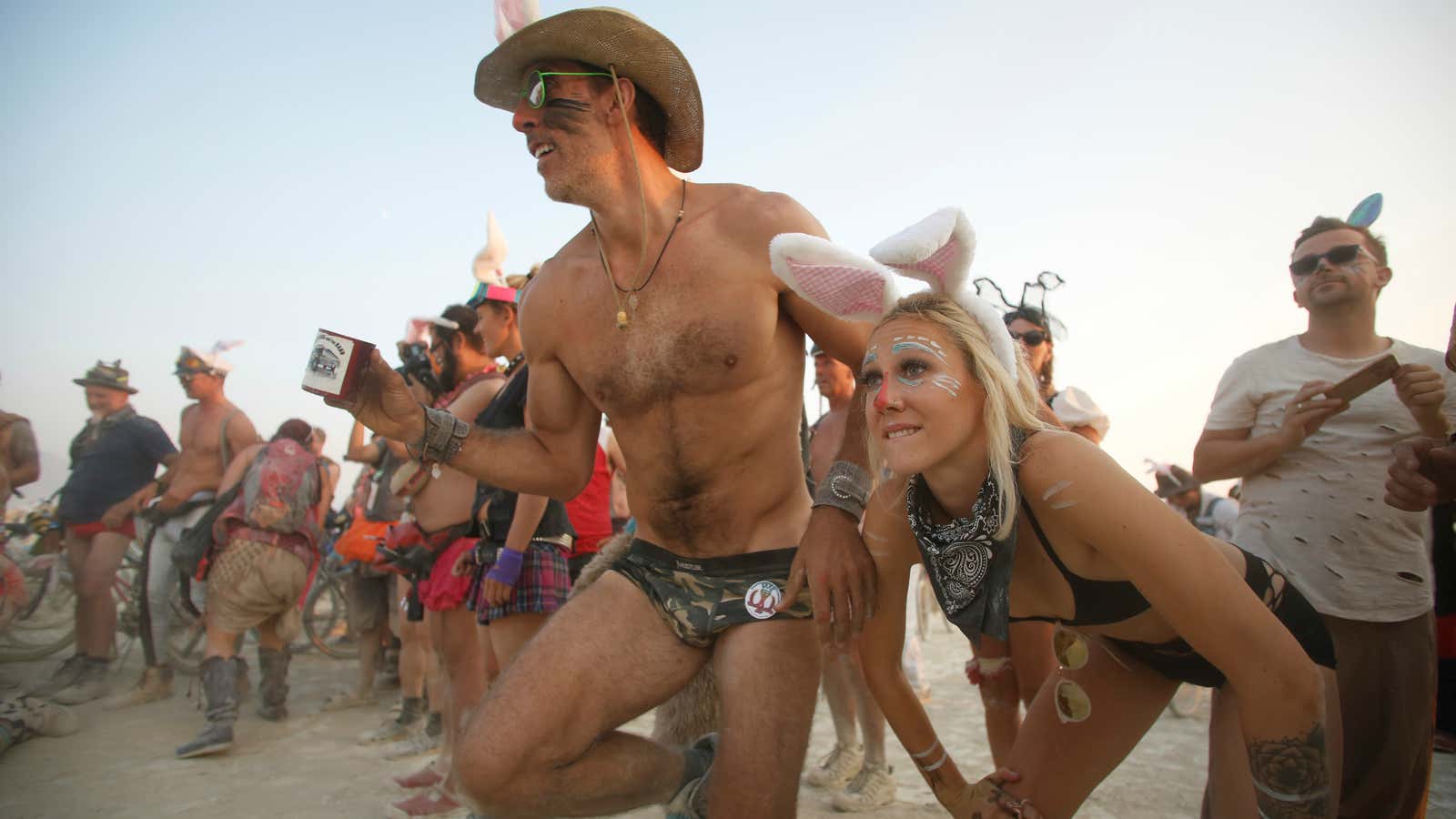“Radical inclusion” is one of the ten principals of the infamous nine-day experimental living and art festival Burning Man, laid out by festival co-founder Larry Harvey. “Anyone may be a part of Burning Man,” it says on the Burning Man website. “We welcome and respect the stranger. No prerequisites exist for participation in our community.”
Yet, looked at in terms of demographics, Burning Man, now in its 31st year, is an increasingly exclusive event.
Every year, towards the end of the US summer, approximately 70,000 people descend on seven square miles in the Nevada desert for the festival, which takes place in the ephemeral town of Black Rock City. Burning Man is a celebration of self-reliance, self-expression, and testing out new identities (and drugs). For many attendees, who call themselves Burners, it’s a liberating experience and the most important event of their year. It is also a central part of Silicon Valley culture.
For the last four years, a group of academics attending the festival have conducted the Black Rock City Census, an astoundingly rigorous sociodemographic survey of the festival’s attendees. The data reveal that Burners are an elite bunch. They are typically white, and far more educated and wealthy than the average American. If Burning Man was a state, the 2016 Black Rock City Census data reveal it would be an extreme version of Massachusetts, one of the US’s wealthiest and most educated states. (2017 data have not been released.)
The demographics of Burning Man versus Massachusetts and the US in 2016
* (non-Hispanic); note: Only US Census statistics for 18-55 years old Massachusetts to match Burning Man’s age demographic.
The data support reports that Burning Man is becoming higher class—the most extreme stories involve rich Burners bringing personal chefs and setting up luxury sleeping arrangements. From just 2013 to 2016, the share of Burners with a personal income above $100,000 grew from around 21% to above 27%. The share with a graduate degree jumped from 24% to 31% (these numbers are estimated from a sample, but are likely to be accurate to 1%).
It’s not surprising that Burning Man attendees are unusually wealthy. A ticket for the festival costs almost $400, and Time estimated that the total cost for camping, transport, food, etc, can reach above $2,000—though many Burners do it for less. Any expensive event that requires a week off from work is almost necessarily going to made up largely of people with money to spare.
Many of the Burning Man attendees I’ve spoken to, particularly those who believe strongly in the festival’s mission, find Black Rock City’s lack of racial diversity particularly disturbing. Nearly 80% of Burners identify as white, and only about 4% as Hispanic, and 1% as black, according to the most recent census.
Larry Harvey once explained away Burning Man’s small black population to the Guardian by remarking that he didn’t think “black folks like to camp as much as white folks.” Harvey also expressed contempt for the idea of trying to check off diversity “boxes.” He hopes all sort of people will feel welcome at Burning Man, but that a culture of acceptance would have to be generated from the inside.
A number of communities that live together during the festival are already looking to diversify Black Rock City. The Burning Man camp Que Viva is dedicated to celebrating diversity, and last year ran a workshop on how white people can be allies for racial justice. The People of Color camp aims to change Burning Man’s demographics simply through partying together in inclusive spaces. These efforts appear to be making a dent: The Census figures show that the share of white people at Burning Man declined from 83% in 2013 to 79% in 2016.
Matthew Eshed, a leader of the People of Color camp, believes you can trace the lack of diversity in Burning Man to the fact that most of the founders were white and that the US remains segregated in many respects. Only through extending out from the original network will the types of people attending shift, Eshed says.
